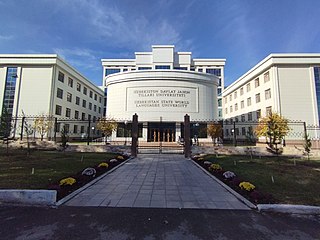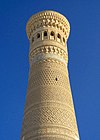
Sheihantaur, the mausoleum of Sheikh Hovendi at-Tahur, is an architectural monument in Tashkent, Uzbekistan.

A bimaristan, or simply maristan, known in Arabic also as dar al-shifa, is a hospital in the historic Islamic world. Its origins can be traced back to Sassanian Empire prior to the Muslim conquest of Persia.

In the post-Soviet era, the quality of Uzbekistan’s health care has declined. Between 1992 and 2003, spending on health care and the ratio of hospital beds to population both decreased by nearly 50 percent, and Russian emigration in that decade deprived the health system of many practitioners. In 2004 Uzbekistan had 53 hospital beds per 10,000 population. Basic medical supplies such as disposable needles, anesthetics, and antibiotics are in very short supply. Although all citizens nominally are entitled to free health care, in the post-Soviet era bribery has become a common way to bypass the slow and limited service of the state system. In the early 2000s, policy has focused on improving primary health care facilities and cutting the cost of inpatient facilities. The state budget for 2006 allotted 11.1 percent to health expenditures, compared with 10.9 percent in 2005.

Ibn Sina Academy of Medieval Medicine and Sciences (IAMMS) is a trust registered under the Indian Trusts Act, 1882. Mohammad Hamid Ansari, former vice-chancellor of Aligarh Muslim University, Aligarh, formally inaugurated it on 21 April 2001. Department of AYUSH, Ministry of Health and Family Welfare, Government of India gave accreditation to the academy in 2004 and promoted it as 'centre of excellence' in 2008. Membership of the academy is open to anyone who has an interest in the academy's activities particularly on history of medicine and history of science. Being a charitable organization, donations to the Academy are also exempted from Income Tax under section 80G of the Income Tax Act 1961.
Medicine in Azerbaijan serves to protect the health and prosperity of citizens of the Republic of Azerbaijan. Reforms in the sphere of medical care and the health care system's direction are parts of a global strategic development program of economic and social infrastructure. This program is based on principles of the establishment of a high-life democratic society with a market economy.
Saidamin Solikhujaev is a hygienist, doctor of medical sciences, professor and honored doctor of the Uzbek SSR.
The Tashkent Automobile and Road Construction Institute was established in Tashkent, Uzbekistan to meet the high demands for professionals in the transportation and automobile fields.

Andijan State Medical Institute (ASMI) is an institute and research center in Uzbekistan, founded in 1955.
The Museum of Communication History in Uzbekistan, is a unique and the first museum in the history of Uzbekistan which is related to the communication technologies. It was established in 2009, and nowadays the museum became one of the most famous museums among Uzbek people.

The Alisher Navoi State Museum of Literature of the Academy of Sciences of Uzbekistan is a scientific-cultural, educational establishment which mainly focuses on collecting and researching the historical materials and objects which are related to Uzbekistan's history. The museum plays a role in the cultural development of young generations in Uzbekistan and it keeps various documents, manuscripts from the Middle Ages.

Tashkent Museum of Railway Equipment is a railway museum in Tashkent and is the only such museum in Uzbekistan.

Museum of Victims of Political Repression in Tashkent — is a museum which tells the history of Uzbekistan during the political repression in the Soviet Union, in particular that of the people killed at that time. The Museum is divided into 10 parts.

The Museum of Geology in Tashkent, Uzbekistan is a geology museum that shows and represents the wealth of mineral and geological resources in Uzbekistan, including valuable stones, minerals and archaeological and paleontological findings.
The Uzbekistan State Museum of Nature is the oldest museum operating in Uzbekistan. The museum's main purpose is to show the natural beauty of Uzbekistan and to help protect its environment. The museum features chronologically-ordered exhibits and seeks to educate visitors about Uzbekistan's geography through time.
Art Gallery of Uzbekistan is established in Tashkent city, after the Independence of Republic Uzbekistan, and became one of the most visited modern museums of local people in Uzbekistan.
The Tashkent Polytechnical Museum is an automotive museum in Tashkent, Uzbekistan. The museum provides technical and mechanical information about cars made from 1800 to 1900, focusing on the history of automobile technology and production in Uzbekistan and around the world. It is located in the Mirabad district of Tashkent.
Tashkent Planetarium is one of the newest constructions in Uzbekistan, and is visited by local people and tourists. Tashkent Planetarium provides visitors with the opportunity to look at outer space, even in the morning, and enlarge their knowledge about the cosmos and the whole universe.

Uzbekistan State University of World Languages is a public university located in Tashkent, Uzbekistan. Islam Karimov established this university by merging two language institutions in 1992.

Amrillo Inoyatov is an Uzbekistani plastic surgeon, former Minister at Ministry of Health of the Republic of Uzbekistan National counterpart of the World Health Organization and former Deputy Advisor to the President of the Republic of Uzbekistan on youth, science, education, healthcare, culture and sports. In 2024, he has been appointed as the Director of the Institute of Health and Strategic Development.













